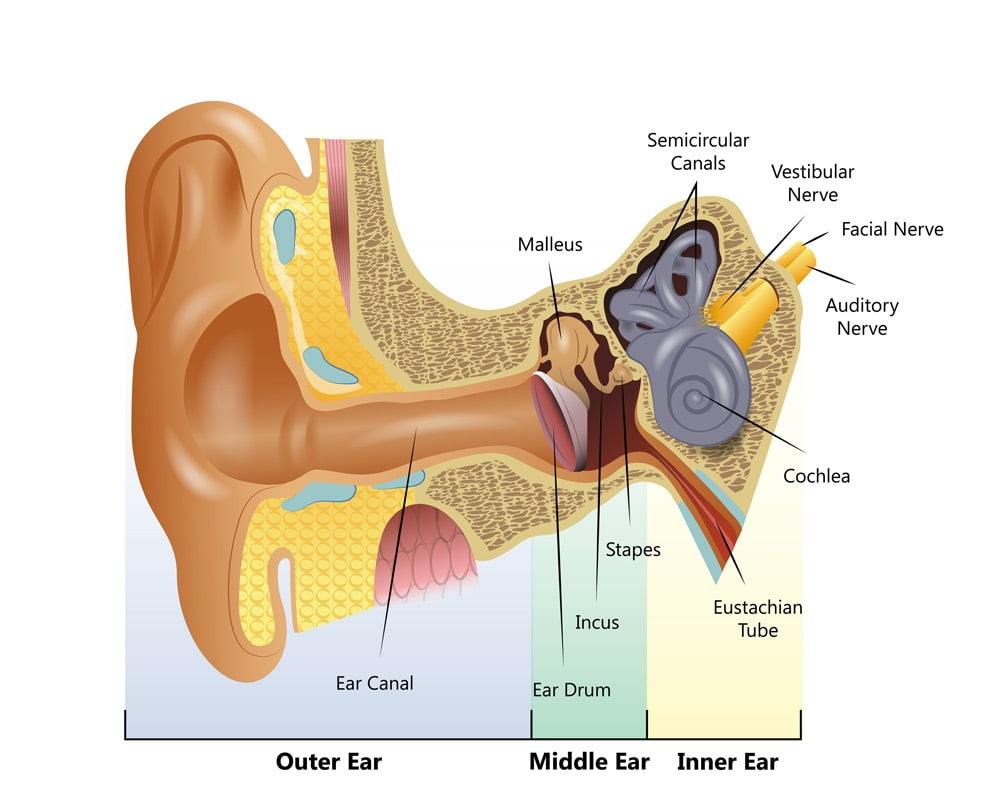What Is an Inner Ear Infection?
An inner ear infection—often referred to as labyrinthitis—can be both uncomfortable and disorienting. It affects the area of the ear responsible for balance and hearing, often resulting in dizziness, nausea, and hearing loss.
In this blog, we’ll explore what causes inner ear infections, how to recognise the symptoms, and what treatments are available to help you recover effectively.
What areas can become infected?
Ear infections come in a variety of forms, and can affect one of three possible areas: your outer, middle or inner ear. Symptoms can vary wildly between each area, but for today we’ll be focusing on the latter.
All three parts of the ear work in tandem to enable us to hear, but it is the inner ear that gives us our sense of balance. That’s why when something goes awry, it can have particularly unpleasant repercussions.
What is the inner ear?
The figure above shows us the different elements that make up the ear. Each has a specific purpose, but it is the cochlea, semicircular canals (or ducts) and vestibular nerve that are of special importance.
The cochlea receives signals and translates them into a message your brain can ‘hear’, while the canals and nerve (which form the vestibular system) tell the brain how our head and body are positioned, thus creating a sense of balance.
Together, these two systems form what doctors call the ‘labyrinth’. This in turn is where we derive the term ‘labyrinthitis’ or inner ear infection.
What causes it to become infected?
Infections are caused by viruses and bacteria which reach the inner ear after affecting other parts of the body. Alternatively, what sometimes feels like an infection can in fact be an inflammation or irritation.
- Viral infection
The inner ear is subject to a mixture of differing viruses, most often the common cold and flu. Infection tends to spread from other parts of the body like the throat or airways, so it’s likely that you will develop further symptoms after already suffering from a cold.
- Bacterial infection
Although much less common, bacterial infections are no less consequential. They occur when the membranes separating the inner ear from the middle are damaged or broken, allowing bacteria to transmit from one area to the next.
- Inflammation or irritation
Often caused by underlying conditions such as autoimmune deficiencies, and indeed often mistaken for an infection, inflammation can be no less significant, and symptoms can worsen over time. Bear in mind that when treating inflammation, these underlying causes may need to be addressed in turn.
What are the signs?
With the inner ear being intrinsically linked to both balance and hearing, the symptoms are far-ranging. Possible signs include:
- Dizziness
- Vertigo
- Nausea or vomiting
- Loss of ambulatory control, i.e. the ability to walk in a straight line
- Feeling unsteady and off-balance
- Hearing loss
- Sense of ‘fullness’ or blockage in the ear
- Tinnitus, i.e., a ringing or buzzing sound in the ears
- Earache
- Headache
- Secretion from the ear such as pus or fluid
- Difficulty in closing your eyes
Bear in mind that if your ear is infected it will mean that the cause has been spread from elsewhere. As such, you are likely to experience other symptoms. For instance, if the root cause is a cold, and it travelled to your ear via your airways, then a runny nose could be an ancillary condition. Other more general symptoms of infection, such as a fever, may also be present.
What are the treatments?
Infections can clear up by themselves within a couple of weeks, yet some can drag on for far longer. If your symptoms are persistent then don’t hesitate to contact one of our professional audiologists or your GP.
In either case, the first port of call should be over-the-counter pain relief and anti-inflammatories like ibuprofen. If your infection is bacterial, then antibiotics may be prescribed, however do note that this is not the case for viruses.
You can of course take some precautionary measures at the outset: keeping yourself upright as much as you can and holding a warm wet towel to your ear are a great start.
What are the long-term effects?
Although things can be extremely uncomfortable in the short-term, thankfully the majority of the symptoms will clear up promptly once the infection passes. It’s possible that some effects may linger, and you may take some time to feel back to your old self, so you should always contact one of our specialists if you still don’t feel quite up to scratch.
If you’re recovering from a bacterial infection then you should take extra care; it may have a more lasting impact on your hearing and it could be worthwhile to book in a hearing test shortly afterwards. Do consider that although inner ear infection itself is not contagious, the viruses and bacteria that may cause them are – your loved ones will certainly appreciate some extra caution!






